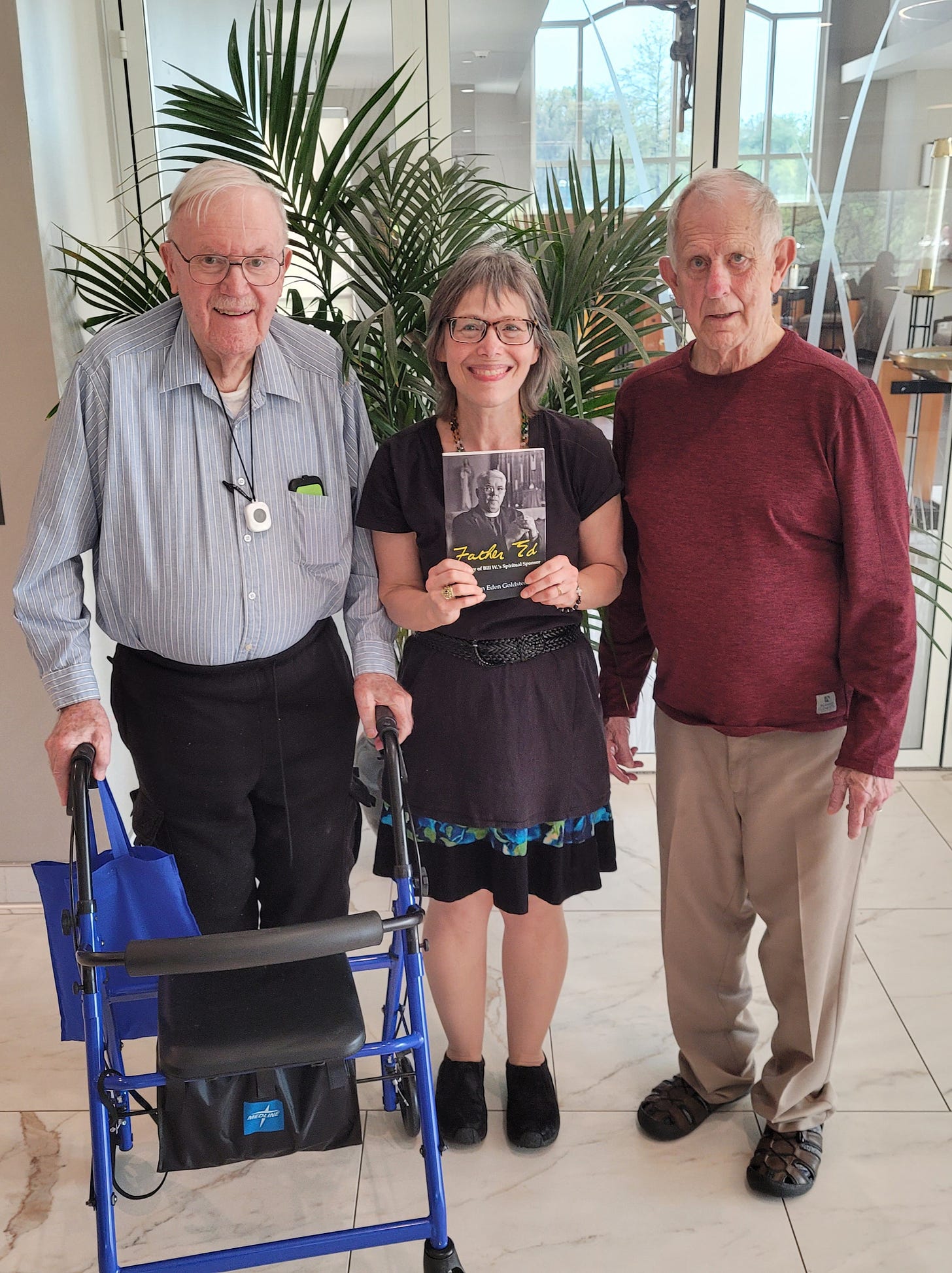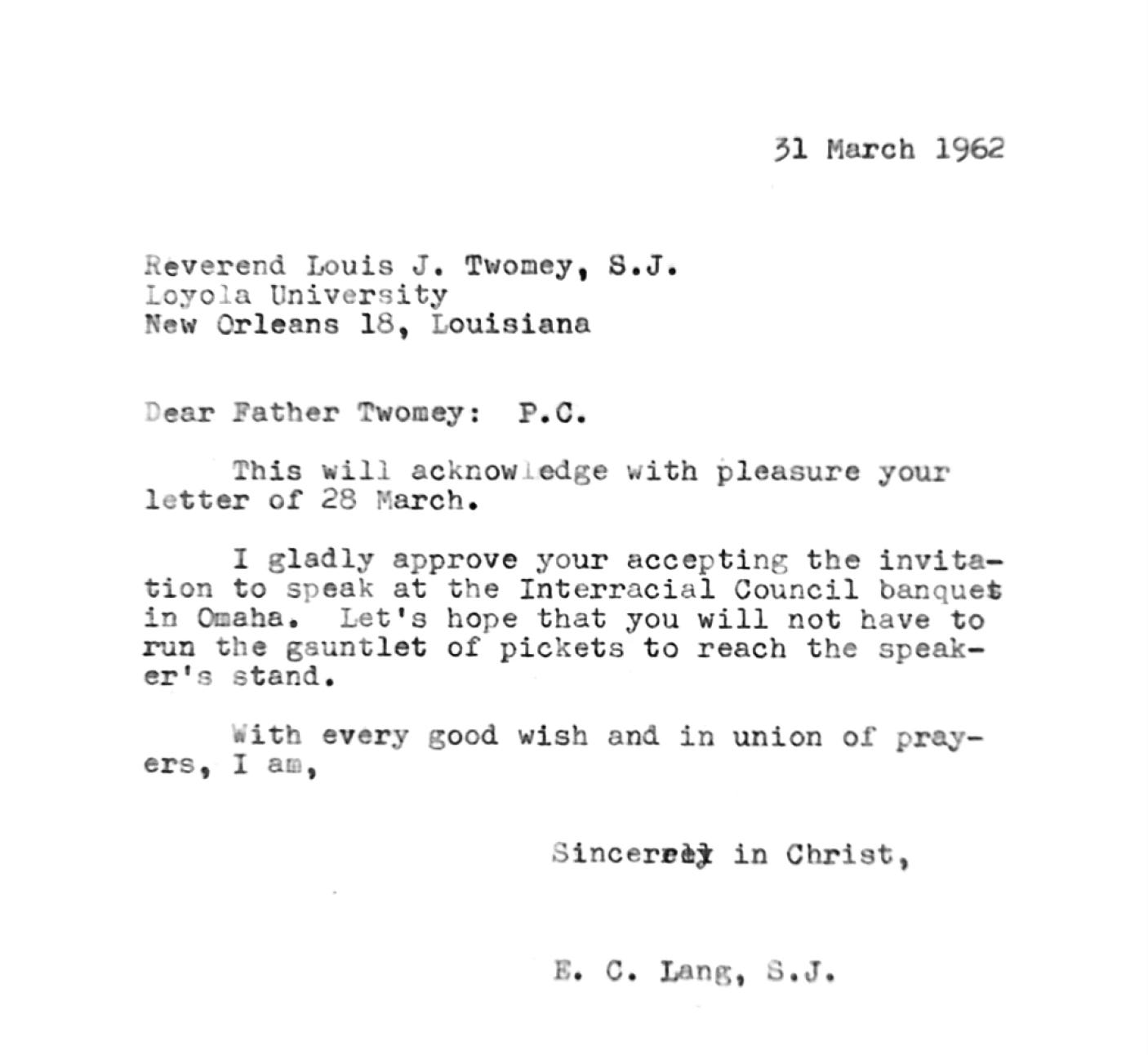Every day I write the book
Beginning Father LJT's biography tonight—with the help of your prayers

I write this from my favorite café in my home city of Washington, DC, having finally settled back in after nearly three wonderful weeks of visits to family and talks on my biography of Father Edward Dowling, S.J., Father Ed: The Story of Bill W.’s Spiritual Sponsor. My last stop on my travels was a one-day visit to St. Louis, where I spent a day doing research for my biography of Father Louis J. Twomey, S.J., at the Jesuit Archives & Research Center (more on that in a moment); visited briefly with fellow Substack author Kevin O’Brien and his wife, who are dear friends of mine; and, last but not least, stopped by the senior residential Jesuit community at St. Ignatius Hall to visit Father John Payne, S.J., who recently moved there from his longtime home at the Jesuit Spirituality Center, the former novitiate in Grand Couteau, Louisiana.
Father Payne’s 1976 University of Texas at Austin PhD dissertation “A Jesuit Search for Social Justice: The Public Career of Louis J. Twomey, S.J.” provided the basis for the monograph At Face Value by C.J. McNaspy, S.J., that provided my introduction to Father Twomey. However, McNaspy’s work didn’t come close to capturing the breadth of Payne’s outstanding. I feel very, very blessed to know Father Payne and to draw upon his wisdom as I write my Twomey biography, A Priest in Good Trouble.
Yes, I said, “as I write my Twomey biography,” and I really and truly am writing it, starting tonight. This blog entry is my last hurrah of hesitation before plunging into composition mode, having cleared my proverbial desk of other assignments (but not having cleared my actual physical desk, alas).
About that Jesuit Archives visit: I thought I had seen everything there was to see of Father Twomey’s papers at the Jesuit Archives when I traveled there last September. But then, last month, research librarian Ann Knake reached out to let me know that they had found a relicta box for Twomey—relicta referring to an odds-and-sods collection of items related to a deceased Jesuit. (It literally means “things left behind.”)
Since I am currently in search of full-time work, and since I don’t yet have a publisher for A Priest in Good Trouble (though that may change soon, Lord willing), I wouldn’t have been able to revisit the JARC on April 15 were it not for the generosity of paying subscribers to Matters Twomey. To those of you who have paid subscriptions, thank you, thank you, thank you. Among the many exciting and extremely helpful things I found during that single day of research:
— An interview with Twomey’s longtime assistant Ray Ariatti in which he describes being sent to represent Father Twomey at Medgar Evers’s funeral. While there, he spoke with Martin Luther King, Jr., who lit up when he learned that Ariatti was there on Twomey’s behalf.
— Many photos of Twomey that I didn’t know existed, including a terrific one of him with Walker Percy.
— An October 1969 letter from Jesuit Superior General Father Pedro Arrupe thanking Loyola New Orleans’s president for sending him a copy of the eulogy preached at Father Twomey’s funeral. Arrupe, who is now a candidate for sainthood, praises Twomey’s “crusading spirit” and his “truly Ignatian spirit and apostolate.”
— And then there’s this response to a speaking request that Father Twomey sent his provincial superior, which conveys so much in just a few words:
After learning about Father Twomey’s May 20, 1962, talk to the Catholic Interracial Council of Omaha, I tracked down articles on it via one of the online newspaper archives to which I subscribe. It was a humdinger! Even before a friendly audience, Twomey had no qualms about calling upon listeners to do better and be better.
“Today in Omaha, you have a serious situation,” Father Twomey said, as reported in the diocesan True Voice newspaper on May 25, 1962. “You had difficulty in passing a fair-employment practices ordinance. There would be no need for such measures if you Christian people would live up to [your] commitments. …
“The longsuffering of the Negro people is a marvel to me. If I were a Negro and had no faith, I would be a raving communist, rising up against my oppressors.”
Wham! I wish I could have been there to hear Father Twomey say that—and to hear the gasps (or perhaps just the stunned silence) that must have followed it from the assembled listeners.
The True Voice’s reporter added, paraphrasing Twomey, “White Americans had to make an ‘act of contrition,’ he said, with the two requirements of such an act: sorrow for past injustices and a firm purpose of amendment so that there may be hope for the future.”
When I read such accounts of Father Twomey’s speeches, I feel so grateful to be telling the story of that great-souled priest.
Please pray for me as I begin work on chapter 1 of A Priest in Good Trouble, starting … now.





